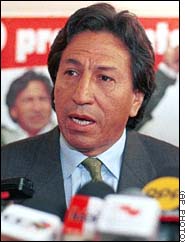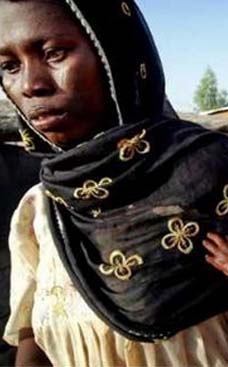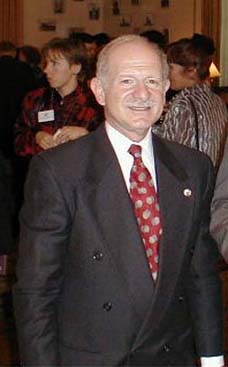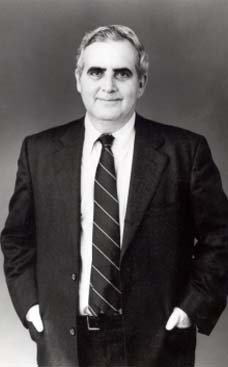
Toledo referred to his life story as he explained why he has proved the pundits wrong and plans to finish strong before he leaves office next year. He has overcome the odds throughout his life, he said. He grew up on a dirt street without running water or electricity, one of 16 children — only nine of whom survived infancy. He was the first member of his family to finish high school, much less college. He is, he noted, the first democratically elected president from an Indian background in Peru's 500-year history. President Alejandro Toledo of Peru was a language instructor for the Peace Corps in the 1960's.
President Toledo says: "I'm not a person who is playing short-term politics. I want to make a difference for my people despite the political price I have to pay in the short term."
Press Delights In Needling Peru President And His Wife
By TYLER BRIDGES
July 15, 2005
LIMA, Peru — Peruvian President Alejandro Toledo visited the provincial city of Cajamarca last month to hand out land titles to peasants. It was part of a successful initiative that gives poor Peruvians the keys to the property on which they have been squatting.
Not a word of this appeared the following day in El Comercio, Peru's establishment newspaper. Instead, coverage of the presidency that day focused on the latest dust-up involving Eliane Karp, the president's Jewish wife.
According to newspapers, when reporters pressed to interview Karp, her bodyguards pushed back and several fell backward.
When a report-er from another newspaper complained to Karp, El Comercio reported, she un-sympathetically responded: "What a shame! Are you going to cry? Well, cry then. You'll feel better."
Four years into his five-year term as president, Toledo admits that such attacks on him and his family still hurt.
"I didn't know the price I would pay would be so high," he told the Forward in an interview aboard the presidential jet as it winged him back to Lima recently. Still, he said, being president has "been a privilege. And I haven't finished yet."
Toledo is a strong United States ally who has presided over one of Latin America's most impressive economic rebounds of recent years. And yet he is perhaps Latin America's most unpopular president. One reason is the unrelentingly hostile press coverage that spotlights every mistake or pratfall by Toledo and Karp.
The press tends to ignore the highlights of trips abroad — he visited China and Israel last month — where he tends to receive star treatment as a rare voice of moderation and progressive pragmatism in a troubled region. In Israel last month, he was invited to address the Knesset. He's only the fourth world leader ever to do so, according to the Israeli Embassy in Peru. None of this has been reported at home.
To be sure, Toledo and Karp have made more than their share of errors. Toledo started off by accepting the highest salary of any Latin American president, later lowering it in the face of protests. For another, he long refused to acknowledge paternity of a teenager who was born while he and Karp were separated.
Karp is an anthropologist and former bank executive who holds Belgian and Israeli citizenship. Raised in Paris, she settled in Israel after high school; she and Toledo met as graduate students at Stanford University in California in 1975. A polyglot who shuns the traditional demure role of first lady, she is quick to lash out when upset — at reporters, Toledo's political opponents and even a one-time ally, Baruch Ivcher, the Israeli-born owner of a leading television network that has skewered the Toledos repeatedly.
These days, Karp rarely speaks to the press. Her popularity is even lower than Toledo's, which rose in a recent poll from 9% to 12%, prompting speculation about a possible rebound.
The constant attacks have taken their toll. Until recently, many observers were convinced Toledo would have to resign before his term ends.
The situation is being watched closely in Washington and other world capitals. Peru is the fourth most populous country in South America and is the linchpin of the turbulent Andean region. The presidents of nations to its immediate north and south, Ecuador and Bolivia, both have been forced out of office in the past three months. Nearby Colombia is plagued by right-wing paramilitaries allied to drug cartels, while Venezuela and Uruguay both have elected presidents identified with the left.
Speaking with the Forward last week, Toledo referred to his life story as he explained why he has proved the pundits wrong and plans to finish strong before he leaves office next year. He has overcome the odds throughout his life, he said. He grew up on a dirt street without running water or electricity, one of 16 children — only nine of whom survived infancy. He was the first member of his family to finish high school, much less college. He is, he noted, the first democratically elected president from an Indian background in Peru's 500-year history.
"I'm a survivor and a winner," he said emphatically.
When asked whether his abysmal poll numbers suggested otherwise, he retorted: "That's a poor measure of a winner. I'm not a person who is playing short-term politics. I want to make a difference for my people despite the political price I have to pay in the short term."
He added that he could have gained popularity by sharply increasing public spending, as critics demanded. Instead, he has allowed only a moderate rise in spending while the economy has flourished.
Karp is only one of several high-profile Jews close to Toledo. The president is known for peppering his private conversation with Yiddish words. At one point, he referred to a lawmaker whom he likes but finds exasperatingly independent as a "meshuggener."
Toledo's Jewish circle also includes his vice president, David Waisman; his best friend, Adam Pollak, who immigrated to Peru 40 years ago from Romania; and his chief of security, Avi Dan, a former Israeli intelligence officer. All are subjects of frequent press comment.
Rabbi Guillermo Bronstein, who came to Peru 20 years ago from his native Argentina, said the country's Jewish community is encouraged that Jews can now hold more public roles. In a country of some 28 million people, Jews number only 3,000, barely one-hundredth of a percent.
But Bronstein added that the high profile has also prompted concern that the foibles of Jews close to Toledo — real or not — could cause a backlash for the Jewish community.
Bronstein noted that Waisman's propensity for shooting off his mouth has the press calling him "a clown," despite an image of honesty.
Pollak and Dan often receive negative coverage and are sometimes referred to in print as "Jews."
"Pollak is seen as working for his own interests, not for Peru," Bronstein said, adding that Pollak, who owns a dye-making business, is a warm friend. "I'm sure that Adam Pollak is not corrupt. But what matters is what people think of him."
A right-wing nationalist newspaper claims, in Bronstein's words, that "Peru is being run by 'Chileans,' 'Peruvian traitors' and 'Jewish mercenaries.'"
"In Argentina," Bronstein added, "you can feel the antisemitism in the street. But the Peruvian people are not antisemitic. It's just that they feel like outsiders or strangers who have come to profit off of Peru are governing them. The Israeli framework around Toledo is one of the reasons for his low popularity."
The latest negative publicity followed the government's decision to release Lee Heifetz, a young Israeli tourist, less than halfway thru her sentence for attempting to smuggle cocaine in her luggage. Coverage in Peru's press suggested that 21-year-old Heifetz had received a favorable deal because her father is Israel's ambassador to Great Britain. Toledo and his justice minister denied favoritism, and no hard evidence has emerged to contradict them.
Toledo also had to deny suggestions that he had an affair with a 23-year-old former bodyguard who, as The Associated Press put it during the height of the media coverage, "posed on the cover of Peru's leading news magazine in a black sleeveless sweater and tight red jeans, with her midriff exposed and a 9 millimeter pistol drawn."
Lost in the media's focus on the missteps of Toledo and Karp is Peru's strong economic performance.
The economy has enjoyed 46 consecutive months of growth, a record unmatched in 50 years. Exports are at record levels, inflation is negligible, and so is the budget deficit.
The June trips to China and Israel should produce even more investment in Peru. In Israel, Toledo held separate meetings with President Moshe Katsav, Prime Minister Sharon, Labor Party heavyweight Matan Vilnai and 30 businessmen.
Toledo has steered a centrist political course as a reliable United States ally on a continent where anti-Americanism has been growing in the wake of the Iraq invasion.
Manuel Torrado, a Lima pollster, said that Toledo's recent rise in the polls stems from the economic gains and from his administration better publicizing its successes.
Still, "Toledo will be fortunate to end his term with a 20% approval rating," Torrado said.
The president, for his part, remains undaunted by the naysayers.
"History is written with deep ink after a period of time," he said aboard the presidential jet. "Let history judge me by the results and by the facts, whether they like my face or not."
Tyler Bridges is a journalist in Lima. His fiancée, Cecilia Tait, is a member of Congress. She recently left Toledo's political party and is now a political independent.












